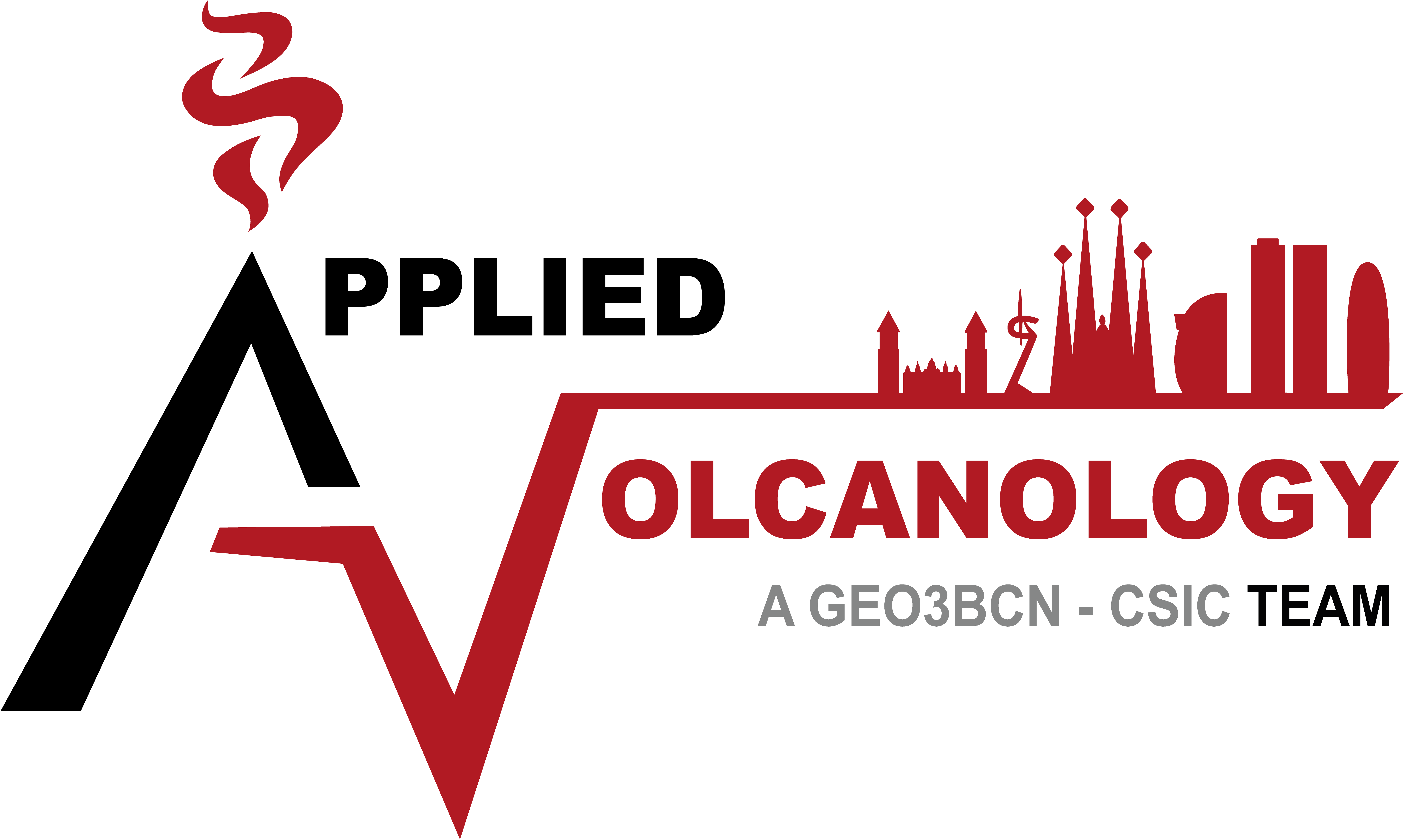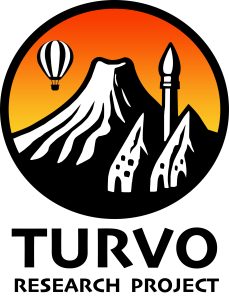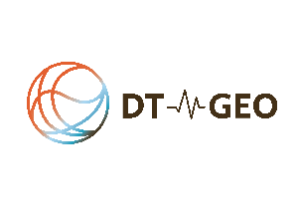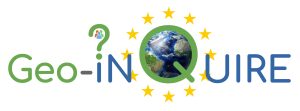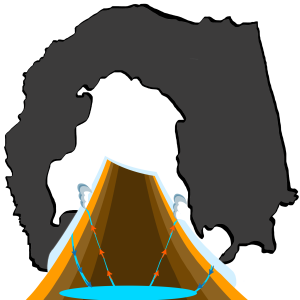ONGOING
TURVO: From past eruptions to future hazards. An interdisciplinary volcanological investigation of central TURkish Anatolian active VOlcanoes
Objectives:
Explosive eruptions from composite volcanoes involve the violent release of huge amounts of pyroclasts and gases—a highly dangerous phenomenon with the potential to significantly impact Europe. The TURVO project focuses on the Central Anatolian Volcanic Province (CAVP), which hosts active composite volcanoes, including Acigöl, Hasandağ, and Erciyes. Despite their status as the most active and largest volcanoes of the CAVP, with evidence of past massive explosive eruptions, critical knowledge gaps persist, hindering accurate volcanic hazard assessment. The primary objectives of the project involve stratigraphic, geochronological, geochemical, and geophysical investigations, complemented by numerical modeling, to unravel the eruptive history, and ash dispersion patterns of the three target volcanoes’ most significant eruptions and quantitatively assess their future volcanic hazards. Overall, TURVO’s interdisciplinary approach aims to establish correlations between proximal volcanic deposits and distal tephra layers identified in marine/lacustrine sediments across Eastern Europe and the Mediterranean region. This broader perspective not only enhances our ability to assess volcanic hazards but also fosters collaboration and knowledge exchange across borders with a transdisciplinary perspective, aligning with international efforts in disaster risk reduction and scientific cooperation.
Coordinator: Xavier Bolós
Years: 2024-2027
Funding:Project PID2023-147255NB-I00 funded by MICIU/AEI/ 10.13039/501100011033
Centre of Excellence (CoE) for Exascale in Solid Earth
Objectives:
The scientific ambition of the second phase of the EU project Center of Excellence in Solid Earth (ChEESE-2P) is to prepare 11 community flagship codes to address 12 domain-specific Exascale Computational Challenges (ECC), enlarging the areas covered during the first implementation phase (computational seismology, magnetohydrodynamics, physical volcanology, and tsunamis) with two additional disciplines (geodynamics and modelling of glacier hazards).
Codes will be optimised in terms of performance on different accelerators, scalability, deployment, containerisation, and portability across current pre-exascale systems and hardware architectures emerging from the EuroHPC Pilots by co-designing with mini-apps.
Optimisation will also include heterogeneous single-node and multi-node performance and continuous efficiency monitoring using the Performance Optimisation and Productivity (POP) metrics. Emphasis will be given on the uptake by science, public administration and industry, including training and capacity building in cooperation with National Competence Centers (NCCs).
Codes and workflows will combine to farm a new generation of 9 Pilot Demonstrators (PDs) underpinned by concepts like multi-scale, multi-source, and multi-physics. The PDs will materialise in 15 Simulation Cases (SCs) representing capability and capacity use cases of particular relevance in terms of science, social relevance, or urgency (the capability SCs include 4 potential Scientific Grand Challenges, i.e. cases that can require an extreme-scale access mode).
The SCs will produce relevant EOSC-enabled datasets and enable services on aspects of geohazards like urgent computing, early warning forecast, hazard assessment, or fostering an emergency access mode in EuroHPC tier-0/tier-1 systems for geohazardous events (earthquakes, tsunamis and volcanoes), including access policy recommendations. Finally, ChEESE-2P will liaise, align, and synergize with other domain-specific European projects and longer-term mission-like initiatives like Destination Earth.
Coordinator: Arnau Folch
Years: 2022-2025
Funding: EU Grant Agreement No 101093038
ChEESE official website: https://cheese2.eu
A Digital Twin for GEOphysical extremes
Objectives:
DT-GEO aims at developing a prototype for a digital twin on geophysical extremes including earthquakes, volcanoes, tsunamis, and anthropogenic-induced extreme events. The project harnesses world-class computational and data Research Infrastructures (Ris), operational monitoring networks, and leading-edge research and academia partnerships in various fields of geophysics.
With present computational capabilities and data volumes entering the Exascale Era, digital twins of the Earth system will be able to mimic the different system components (atmosphere, ocean, land, lithosphere) with unrivaled precision, providing analyses, forecasts, and what if scenarios for natural hazards and resources from their genesis phases and across their temporal and spatial scales.
The project will merge and assemble latest developments from other European projects and Centers of Excellence to deploy 12 Digital Twin Components (DTCs), intended as self-contained containerized entities embedding flagship simulation codes, Artificial Intelligence layers, large volumes of (real-time) data streams from and into data-lakes, data assimilation methodologies, and overarching workflows for deployment and execution of single or coupled DTCs in centralized HPC and virtual cloud computing RIs. Each DTC addresses specific scientific questions and circumvents technical challenges related to hazard assessment, early warning forecast, urgent computing, or resource prospection. DTCs will be verified at 13 Site Demonstrators (SD) and their outcomes will contain rich metadata to enable (semi-)automatic discovery, contextualisation, and orchestration of software (services) and data assets, enabling its integration to the European Open Science Cloud (EOSC). The proposal aims at being a first step of a long-term community effort towards a twin on Geophysical Extremes integrated in the Destination Earth (DestinE) initiative.
Coordinator: Arnau Folch and Ramon Carbonell
Years: 2022-2025
Funding: EU Grant Agreement No 101058129
DT-GEO official website: https://dtgeo.eu
Geosphere INfrastructures for QUestions into Integrated REsearch
Objectives:
Geo-INQUIRE started on 1 October 2022. It will provide and enhance access to selected key data, products, and services, enabling the dynamic processes within the geosphere to be monitored and modelled at new levels of spatial and temporal detail and precision.
The project aims to overcome cross-domain barriers, especially the land-sea-atmosphere environments, and will exploit innovative data management techniques, modelling and simulations methods, developments in AI and big data, and extend existing data infrastructures to disseminate these resources to the wider scientific community, including the EOSC landscape.
Geo-INQUIRE benefits from a unique partnership of 51 partners consisting of major national research institutes, universities, national geological surveys, and European consortia. Geo-INQUIRE will enhance and make interoperable the activities of the involved partners and conduct dedicated training programs for their optimal use. A portfolio of 150 Virtual Access (VA) and Transnational Access (TA, both virtual and on-site) installations will be offered to the scientific community.
While many such resources are already available at a high level of maturity, Geo-INQUIRE will ensure that they not only reach the highest level of scientific excellence through targeted actions on availability, quality, and spatial and temporal resolution, but also that they follow FAIR principles, adopt proper standards and open licenses, and aim at cross-disciplinary interoperability.
Furthermore, the integration of different data, including new observables, products, and services will be optimized through TA activities via 7 test beds, which will also host workshops and summer schools dealing with the available resources. Ultimately, Geo-INQUIRE, with its enhanced data, product, and service portfolio, will enable the next generation of scientists to carry out leading-edge research addressing societal challenges from a multidisciplinary perspective, making intelligent use of these resources.
Coordinator: geo-i_pmo@gfz-potsdam.de
AV-Team participants: Arnau Folch, Adelina Geyer
Years: 2022-2025
Funding: EU Grant Agreement No 101058518
GEO-INQUIRE official website: https://www.geo-inquire.euhttps://dtgeo.eu
Geohazards Early Digital Twin Component (GET-IT)
Objectives:
Anticipating extreme geological events: volcanic eruption forecasts through the development of data assimilation and pattern recognition strategies
Objectives:
This project investigates how subsurface volatile circulation drives volcanic unrest and translates that knowledge into eruption-forecasting frameworks. In particular, we tackle the following questions: (i) Which physicochemical processes link porous-media transport in the subsurface to surface indicators of unrest? (ii) Can data-assimilation strategies fuse observations with physics-based models to produce reliable forecasts? And, (iii) how do physics-based forecasts complement pattern-recognition approaches? To address these questions, we develop new computational models of processes producing geophysical, geochemical, and remote-sensing signals; apply inversion and optimization techniques to interpret observations; use advanced statistical methods to propagate uncertainties and analyze time series; and implement near-real-time workflows that deliver visual products. Our specific objectives are to: (1) Design a data-assimilation strategy to forecast volcanic activity from continuous seismic data; (2) design a data-assimilation strategy to forecast volcanic activity from satellite thermal-infrared data; and (3) build an AI pattern-recognition framework that combines seismic, thermal-infrared, and other datasets to produce eruption probabilities. This integrated program bridges fundamental and applied science to strengthen volcano-monitoring assessments worldwide and thus reduce risk to communities and infrastructure.
PI: Társilo Girona
Funding: Grant RYC2023‐043480‐I, funded by MCIU/AEI/10.13039/501100011033 and by the FSE+. RYC-MaX Excellence Grant from CSIC.
PAST PROJECTS
«Living Among Volcanoes» is a science outreach project developed in the La Garrotxa Volcanic Field (Catalonia, Spain), aimed at improving public knowledge about volcanic activity and promoting a culture of prevention in the face of potential natural hazards.
Through surveys, a short documentary film, and a traveling exhibition, the project assesses the level of scientific literacy and risk perception among residents and visitors. Its goal is to combat misinformation, debunk myths about volcanoes, and strengthen society’s ability to respond to a possible eruption in the area.
The project is led by the Institute of Geosciences of Barcelona (GEO3BCN-CSIC), in collaboration with the Espai Cràter in Olot and the University of Barcelona. It is financially supported by the Spanish Foundation for Science and Technology (FECYT) – Ministry of Science, Innovation and Universities.
Coordinator: Adelina Geyer
Years: 2024-2025
Funding: FECYT project – FECYT/FCT-23-19352
Structure And Dynamics Of Hydrothermal Systems In Polar Volcanic Calderas
Objectives:
HYDROCAL project aims at characterizing the structure and dynamics of hydrothermal systems in polar and sub-polar active volcanic calderas, evaluating any particularities due to their location at higher-latitudes and under extreme climate conditions. As case studies, we propose Deception Island (Antarctica) and Torfajökull (Iceland) calderas in order to stablish similarities and differences among both examples to provide, at the end, a full conceptual and evolutionary model of caldera-hosted hydrothermal systems in polar and sub-polar areas. Obtained results will be compared to the most documented and well-known active caldera hosting an hydrothermal system and located in a temperate climate: Campi Flegrei (Italy).
Active volcanic areas are commonly related to the presence of hydrothermal systems. Particularly prone to host these are volcanic collapse calderas, depressions resulting from the sinking of the chamber roof into the magmatic reservoir due to the rapid withdrawal of magma during the course of an eruption. Following the caldera collapse, water infiltrates through the ring fractures and caldera-crossing faults, which form zones of fracture permeability. Once at depth, this water is heated up by the remnant, or newly intruded, magma and raises again to the surface generating fumaroles and hot springs, altering rocks, etc. During the last years, it has been evidenced that characterizing the structure and dynamics of hydrothermal systems of active volcanic calderas is fundamental for:
- advancing in our understanding of volcanic processes occurring after the caldera collapse;
- improving volcanic hazard assessment by assessing the future occurrence of phreatic and phreatomagmatic eruptions and their related hazards and hence;
- understanding the processes behind caldera unrest and improving our capacity to correctly interpret monitoring signals,
- more effective knowledge-based exploitation of mineral and energetic resources.
Many research studies have been done to understand the dynamics of hydrothermal systems in worldwide volcanic calderas (e.g., Campi Flegrei, Italy). However, the current knowledge on hydrothermal systems in polar and sub-polar calderas is scarce and mostly concentrated on individual Icelandic calderas.
Project Coordinator: Adelina Geyer
Years: 2021-2024
Funding
Project PID2020-114876GB-I00 funded by

HYDROCAL official website: https://hydrocal.es/
Science 4 Policy: El Riesgo Volcánico
Objectives:
The CSIC’s mandate includes informing, assisting, and advising public and private entities on matters of science and technology, as stipulated in Article 5 of its Statutes. Within this framework, CSIC presents the Volcanic Risk report as part of its Science for Public Policy collection. This report targets both public and private sectors, along with society at large. It delves into essential concepts of volcanic risk, assesses its impacts, and offers a comprehensive framework for studying and effectively managing volcanic risks based on CSIC’s research initiatives. It promotes proactive preparedness, coordinated responses, and sustainable recovery strategies following volcanic eruptions. The report aims to furnish critical insights for informed decision-making and to bolster scientific advancements that benefit authorities and society in general.
AV-Team coordinators: Xavier Bolós, Stéphanie Barde-Cabusson, Adelina Geyer
Years: 2024
ClimeErupt: Impact of climate change on monogenetic eruptions
Objectives:
One of the key challenges in volcanology is to understand the factors that increase the explosiveness of eruptions. The presence of groundwater is one of them, because it can drastically increase volcanic explosivity and generate phreatomagmatic eruptions. These types of eruptions occur when rising magma interacts with aquifers, producing sudden and violent activity, which makes forecasting particularly difficult.
The impacts of explosive volcanism on global climate have been intensively investigated and well documented. Large volcanic eruptions are known to modulate downwelling solar radiation by injecting sulphur, gases, and fine ash into the stratosphere, thus cooling Earth’s surface in the short term. However, the opposite relationship of how climate change can affect volcanic activity is still largely unknown.
Climate change intensifies the frequency of dry periods combined with warming trends. This global situation strongly alters the groundwater table, and consequently, volcanic activity can be modified. The ClimeErupt project aims to study how future phreatomagmatic eruptions could be affected by local aquifer variations caused by global warming trends, presenting new risks for climate-related volcanic hazards.
This ComFuturo project proposes the development of a new tool for forecasting phreatomagmatic eruptions under the effects of climate change through the quantification and modelling of magmatic and hydrogeological parameters. This tool will contribute to the reduction and mitigation of the risk of these types of eruptions by using quantitative models and volcanic activity forecasts. In addition, it represents a step forward in the social understanding of the effects of global warming, focusing on variations in groundwater resources and their impact on eruptions.
Fundación General CSIC (FGCSIC) is a private non-profit organisation created by a joint initiative of the Spanish National Research Council (CSIC) and its founding patrons. With broad experience in promoting public-private collaboration programmes in research and innovation, in 2014 FGCSIC launched the ComFuturo programme, an alliance with the CSIC and leading private entities to attract the best young research and entrepreneurial talent. The ComFuturo Programme is supported by the Marie Skłodowska-Curie Actions (MSCA) COFUND of the European Commission. The MSCA are the European Union’s flagship funding programme for doctoral education and postdoctoral training of researchers. They fund excellent research and innovation and equip researchers with new knowledge and skills, through mobility across borders and exposure to different sectors and disciplines.
The MSCA promote excellence and set standards for high-quality researcher education and training in line with the European Charter for Researchers and the Code of Conduct for the recruitment of researchers.
Coordinator: Xavier de Bolós Granados
Years: since April 2023
The project comfuturo has received funding from the European Union’s Horizon 2020 research and innovation programme under the Marie Sklodowska-Curie grant agreement Nº 101034263
